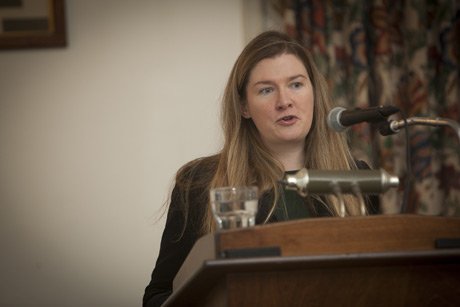Meyler describes 'love triangle' of law, literature, history
By Sam Wolken

The way Bernadette Meyler tells it, the relationship between law and the humanities ventures into scandalous territory. Within the "love triangle" of literature, history and law, Meyler said, "jealousies arrive alongside passions. Perhaps unsurprisingly, the jealousy in this particular triangle often focuses upon a long-standing relationship between law and history. That connection appears to marginalize literature, allowing it brief affairs with law or history."
Meyler, Cornell professor of law and a faculty member of the graduate field of English, spoke Feb. 20 to about 60 graduate students and faculty members at the Annual Faculty Invitational Lecture hosted by the Society for the Humanities at the A.D. White House. Surveying research on the intersection of law and the humanities, she explained how incorporating history and the study of literature into the context for legal decisions can provide useful insights into the history of law.
While teaching introductory constitutional law courses to first-year law students, Meyler became frustrated with the casebooks' narrow-minded presentation of Supreme Court decisions. To provide context, Meyler presented her students with the "lawyer's lawyer version of the materials," including the legal and historical precedents Supreme Court justices referenced in their decisions. In reconstructing the cases, Meyler said she and her students "watched the process of constitutional meaning-making at work and observed the effects of constitutional rhetoric in action."
Meyler addressed a current intersection of popular culture and the legal system: the "CSI effect." Studies have suggested that TV shows like "CSI (Crime Scene Investigation)" may alter jurors' expectations of physical evidence in the courtroom. Meyler said empirical evidence has debunked this theory, but interesting questions linger, such as why jurors should "check their 'CSI'-related requirements at the door."
Meyler's recent work has implications for legal education. Economic stress and media attention have led some law schools to focus on practical skills exclusive to the legal profession and less on interdisciplinary education. Some say this "clinical education" approach better prepares students to be practicing attorneys. "One of the challenges facing law, literature and history in the coming years," Meyler said, "will be to oppose that notion."
She concluded by urging the audience not to separate law from the humanities. "New methods in legal history and in literary study suggest a way forward that may not entail arguing for law and the humanities against clinical legal education, but rather in conjunction with it. Can we, I ask, imagine a law, literature and history clinic, and what would it look like?"
"It remains to be seen," she added, "whether the love triangle will become a true ménage à trois."
Following her lecture, Meyler discussed topics with the audience ranging from Steven Spielberg's portrayal of Abraham Lincoln and the 13th Amendment to positivism and modern literature.
Meyler's forthcoming book is "Theaters of Pardoning: Sovereignty and Judgment from Shakespeare to Kant," and she is working on a book titled "Towards a Common Law Originalism." She holds a J.D. from Stanford Law School (2003) and a Ph.D. in English from University of California-Irvine (2006).
Sam Wolken '14 is a writer intern for the Cornell Chronicle.
Media Contact
Get Cornell news delivered right to your inbox.
Subscribe